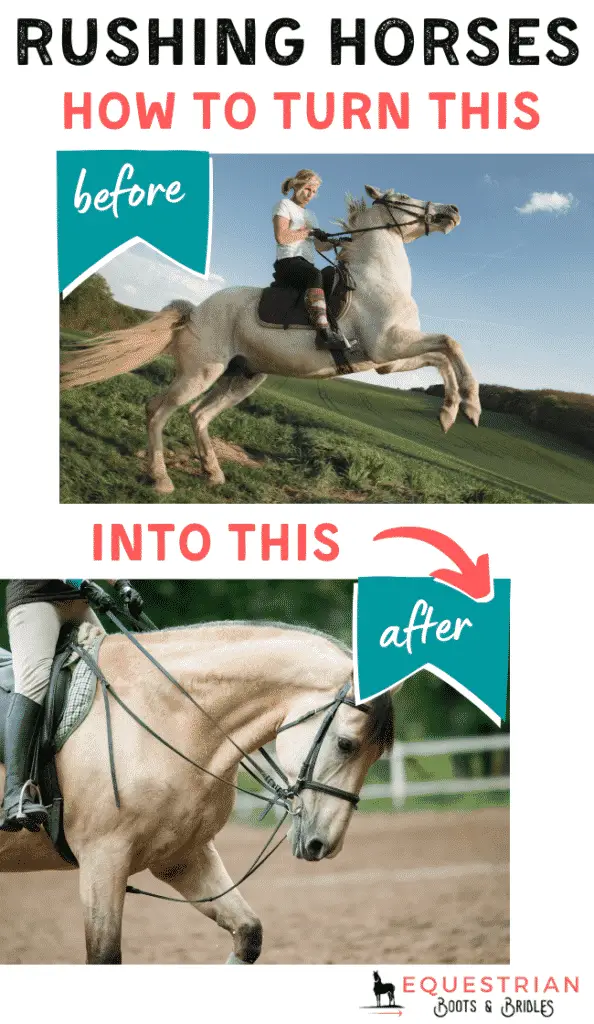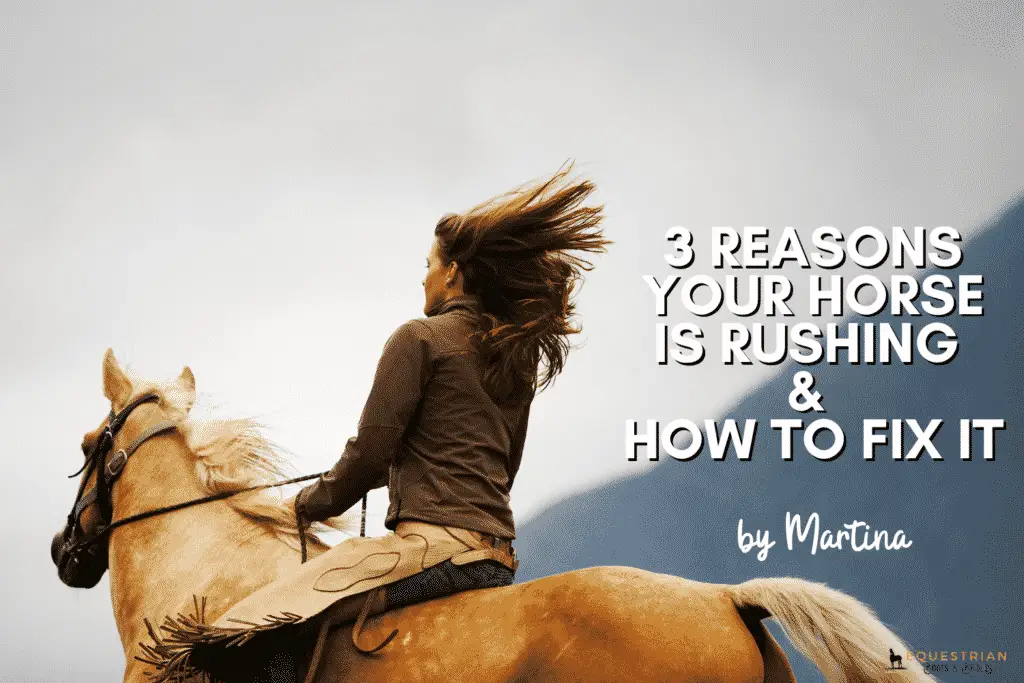I’ve ridden three different horses (Comet, Dash & Rudy) that have been extremely forwards to the point that I felt out of control and really off balance at times in the saddle. I’m sure you can relate to that feeling and it’s not the most fun.
Slowing down a rushing horse can be frustrating. The last thing I want to be doing is incessantly pulling on my horse’s mouth when I’m trying to get a nice even trot or canter. At times it felt like that was my only option, especially when I was bouncing around all over the place up there.
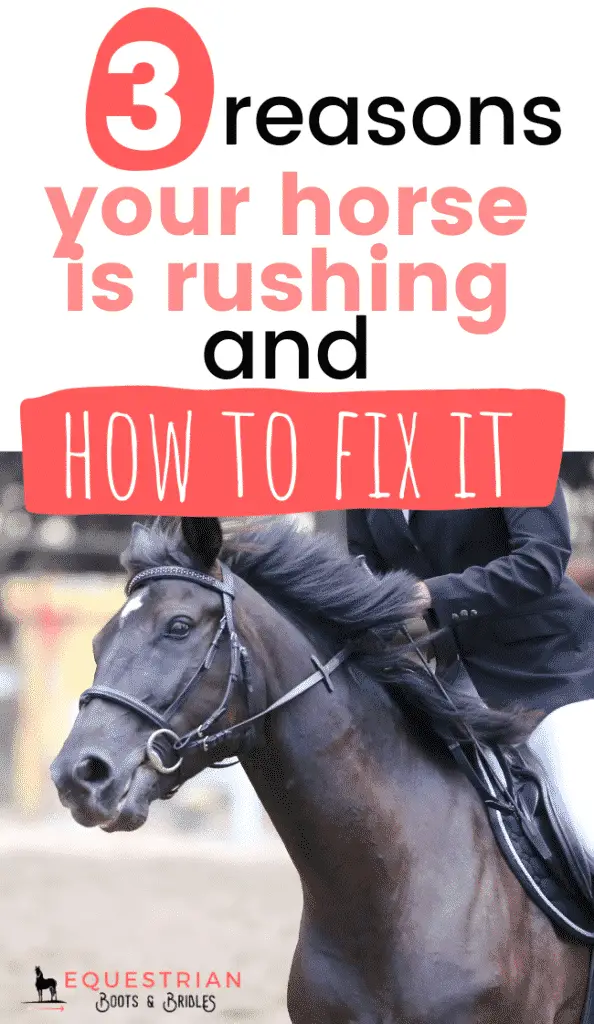
It’s much nicer and smoother to have a horse moving from their hindquarters in a balanced, more uphill fashion. The goal is to get to this point without just pulling on the reins non-stop (which typically doesn’t work anyways!)
There are various reasons why your horse might be taking off on you. When you’re trying to slow down a hot horse, you need to first diagnose “the problem” before you can get to fixing it.
All three of those horses had different reasons for being so forwards and if I had tried to fix all three of them using the same method than it wouldn’t have worked out very well.
So, let’s figure out WHY your horse is going fast and then we can fix it.
Slowing Down A Rushing Horse: Why Is My Horse So Forward Going?
As with most horse problems, it’s never a bad idea to have a vet check your horse out as well. My current 4-year-old gelding, Rudy, would speed up and slow down and speed up and slow down for a while while tossing his head when I first started riding him.
It turned out that he hadn’t had his teeth done prior to being bridled for the first time so I had his teeth floated and he had an ulcer on the left side of his mouth! After a few days, he never tossed his head anymore and his pace at the trot was WAY more consistent.
The following are the three reasons that I’ve come accross in my riding and what I’ve figured out how to address. I’m sure there are also other reasons out there (i.e. Rudy’s ulcer issue!) but I believe they are pretty uncommon and typically quick to rule out and fix.
Reason #1 | Your Horse is Naturally Hot & Enjoys Going Fast
A lot of people default to reason #1 for their horses going fast. Yes, this is definitely a possibility but it’s actually not the most common reason. Horses – like people – tend to be on the lazier side especially as they get older. Also, no horse is “naturally hot” 24/7.
How Can I Tell if My Horse is Naturally Hot?
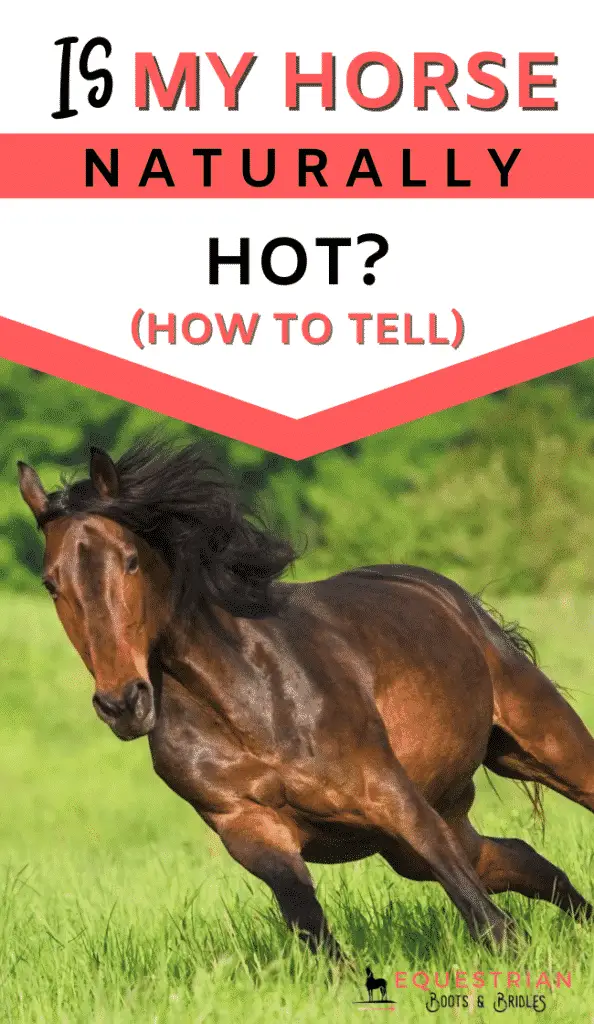
A pretty telling sign that your horse just likes to go fast is if they tend to randomly start galloping around their paddocks. Comet used to do this all the time while the other horses just lazily stared at him while grazing.
Rudy also does this in the late afternoon. Him and Bobbi (a mare that he’s really bonded to) will canter around their paddocks just for fun together. The other horses are all by the hay chewing and will occasionally look up. It’s almost like they’re the parents all sitting and talking while they watch they’re kids run around like crazy.
Solution: At the Beginning of Your Ride, Just Let Them Go Fast!
So many times in our riding, we want to control every little thing. It’s amazing how sometimes just letting go of control and letting the horse be a horse for a few minutes can make a HUGE difference.
If you’re nervous, you can do this on a lunge line or just hang on to your horse’s mane in a two-point while they run around the arena for a bit.
I’ve written an entire post on it’s own about naturally hot horses. If this is what you’re struggling with I think it will be helpful for you to go through it: [Post 1 here]
Reason #2 | Your Horse is Anxious
This is the problem I had with Dash. He was extremely anxious all the time. He would stand with his head straight up in the air all the time, not blinking, never licking and chewing, never putting his head to the ground. He was like a robot in everything he did.
A lot of horses that are reactive and have high anxiety will also typically fall into the category of Reason # 3 below so keep reading. If you want to calm down a hot horse that lacks emotional regulation, you’ll have to address the anxiety’s mental AND physical roots. Not all horses have anxiety stemming from both but it’s more common than not I would say.
For right now, let’s focus on the mental aspect and then we can figure out if your horse also has Reason #3 for rushing.
How Can I Tell if My Horse is Anxious?
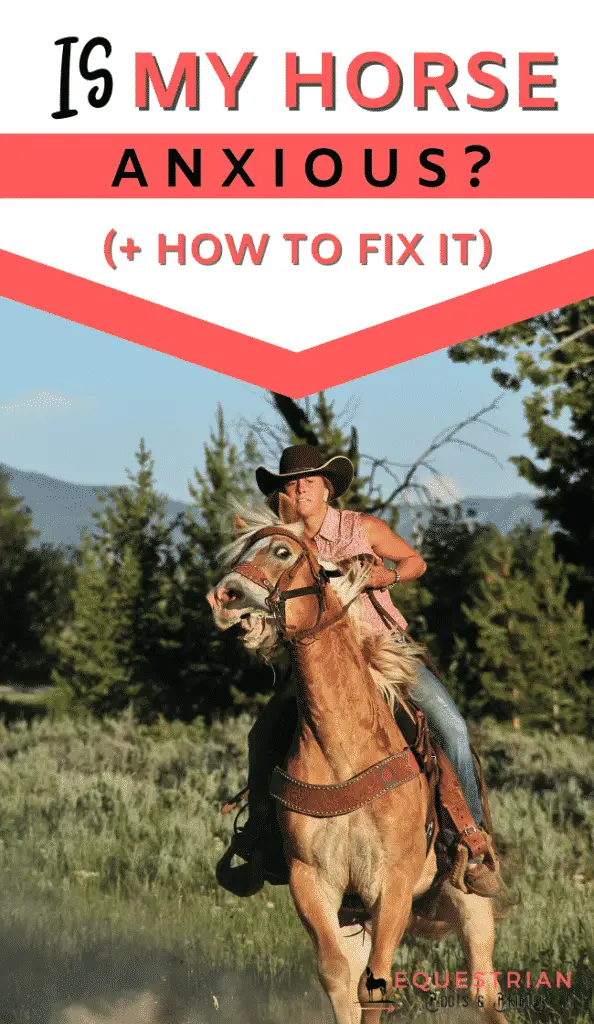
A telltale sign that your horse might have high anxiety levels is if they spook at everything. Usually these horses won’t give you any relaxed indicators either (licking and chewing, hanging they’re head low, yawning, rolling or lying down).
Solution: Calm Your Hot Horse By Circling to Stop & Learning To Communicate
Circling to stop is a really neat trick. Essentially you pick up on one rein to put a bend in your horse and keep that bend there until your horse stops. Make the bend tighter if you need to as you slow down (without compromising on safety, of course). You want to use this to stop as often as possible.
Don’t release your horse from that inside rein contact until they’ve come to a complete stop. Sometimes it will take minutes even from just a walk if your horse is really strung out. Try your best to be patient and wait for the full stop.
Unfortuantely, I did not know about these techniques when I was working with Dash but I’m very confident he would have benefited greatly from them.
Learning to communicate with your horse is a little bit more intense of a topic. I’ve written an entire post about reactivity and anxious horses that goes through the “circling to stop” method in detail and also gives a crash course on communicating with your horse to lower anxiety. If anxiety is what your horse is struggling with, read this post to find out how to fix it: [Post 1 here]. I talk more about Dash and his issues with jumping as well there.
Reason #3 | Your Horse Lacks Strength
This one usually surprises people. I know I used to think: “If my horse is not strong enough, wouldn’t he be going slower?” It actually takes a stronger horse to properly balance themselves around bends and corners without falling in and rushing forwards.
The last section dealt with the emotional aspect of highly reactive horses whereas this section deals with the physical aspect – both the problems need be addressed to really fix the horse’s issue.
Think about when you’re anxious. There’s the mental aspect (what are you thinking about that’s making you anxious?) and then there’s a physical aspect (are you holding your breath? tensing all your muscles? hyperventilating?). It’s the same with horses.
Dash travelled hollow and was very weak, which (I know now) contributed significantly to his anxiety. He would almost fall over whenver he was cantering on the right lead.
Rudy is also weak, however, he is young. Most young horses aren’t strong enough to carry themselves properly yet. It takes a few years for them to develop the proper musculature and this is completely normal.
How Can I Tell if My Horse is Weak?
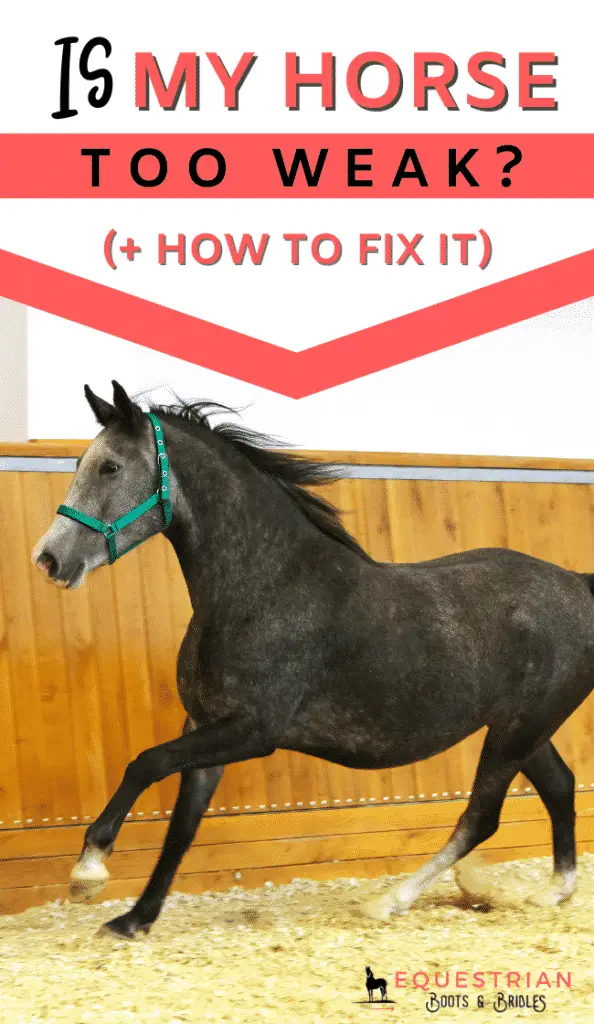
There are three signs that your horse is too weak to support themselves properly (and you):
- Your horse swings way out to the outside on turns when cantering and feels like he might fall over.
- Your horse has a “hollow” back or a “sway” back.
- Your horse leans on the reins all the time and you feel like if you were to give him a loose rein, he would just fall over.
Solution: Start “Stretching” Your Horse
You might be thinking to yourself: “What in the world is stretching? Am I supposed to start doing Yoga with my horse now?” At least that’s what I thought when I first heard the term.
“Stretching” a horse is a technique that was developed by the Spanish Riding School in Vienna to train their prized stallions in dressage. It’s taught in California (and online) by Will Faeber, an amazing horse trainer, in his program “Art2Ride”.
You can purchase his videos here: https://art2ride.com/premium-video-content/
Please note that I am not receiving any kind of commission or compensation by recommending these videos to you. I 100% believe in them and I’ve bought them myself and use them with Rudy every single time I lunge or ride him.
I would recommend buying all of them but if you’re on a budget, get “Work in Hand: The Riding Master’s Secret” and the first video in the “Training the Young Horse” series as that will give you a basic understanding on how to do the stretching technique with your horse.
If this is the problem you’re struggling with, I would suggest reading this more in-depth post on weaker horses: [Post 1 here]
By now, you should have diagnosed the reason why your horse is going way too fast and hopefully you know the path to fixing the issue! Let me know in the comments if you have any questions or if you need further help and we can put our heads together.
I talk more about slowing down hot horses in my FREE Beginner Rider’s EBook.
It’s 8 Chapters of the biggest lessons I’ve learnt while riding that I wish I knew as a beginner with 2 more advanced Chapters and 4 Bonus Chapters on cantering and jumping!
Sign up below and you’ll get it directly to your inbox for free:
Want to learn more about fast horses? This is my entire library of posts just on the subject of “How to Slow Down A Horse”:
- How To Slow Down A Horse
- How to Slow A Horse Down Without Pulling The Reins
- How to Calm an Anxious Horse
- Stop Rushing In The Canter
Having other issues with your horse? Here’s some other posts I’ve written you might like:
- How to Move A Horse Forward Under Saddle
- The Secret Walk-to-Trot Riding Aid
- How to Sit the Trot
- How to Establish Neck Flexion
- How to Collect a Horse
- How to Ride Without Stirrups
- How to Stop a Bolting Horse
- How to Ask for the Canter
- How to Master Jumping While Minimizing Fall Risk
Happy riding,
Martina
Enjoy this post? Share it! 🙂
